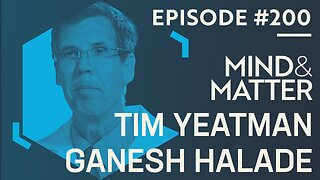Premium Only Content

Why Do Animals Sleep? | Vlad Vyazovskiy | M&M 202
Short Summary: A deep dive into the enigmatic world of sleep, exploring its biological functions, evolutionary origins, and the diverse manifestations across different species.
About the Guest: Vlad Vyazovskiy, PhD is a Professor of Sleep Physiology at the Department of Physiology, Anatomy, and Genetics at Oxford University.
Full Summary: Dr. Vlad Vyazovskiy discusses the complexities and mysteries of sleep, challenging the notion that sleep's function is fully understood. He explains how sleep might serve different purposes across species, from being a recuperative period to possibly being a default state of existence. The conversation covers sleep's behavioral and neural definitions, the variability in sleep patterns among animals like penguins and dolphins, and how sleep might relate to synaptic plasticity, metabolism, and even survival strategies like hibernation. Vyazovskiy also touches on his research with psychedelics, showing how these substances can induce unique brain states that blur the lines between wakefulness and sleep.
Key Takeaways:
Sleep as a Mystery: Despite extensive research, the fundamental reason why animals sleep remains elusive, with no comprehensive theory yet agreed upon.
Local Sleep Phenomenon: Sleep might not be a whole-brain event; even within a sleeping brain, different areas can be in different states of activity or rest.
Sleep in Animals: Sleep varies widely among species, from micro-sleeps in penguins to unihemispheric sleep in dolphins, suggesting sleep could serve multiple, context-dependent functions.
Synaptic Homeostasis: The hypothesis suggests that sleep could be crucial for renormalizing synaptic connections formed during wakefulness, although this idea is still under scrutiny.
Hibernation & Torpor: These states relate to sleep but involve significant metabolic changes, possibly acting as survival mechanisms by conserving energy and reducing detectability by predators.
Psychedelics & Sleep: Research shows psychedelics like 5-MeO-DMT can induce states where animals show signs of sleep in their brain activity while physically active, hinting at complex interactions between brain states and consciousness.
00:00:00 Episode Intro
00:01:12 Guest Intro
00:03:04 Mystery of Sleep
00:11:03 Local vs. Global Phenomena of Sleep
00:45:58 Sleep Homeostasis & Synaptic Homeostasis Hypothesis
01:03:04 Individual Variability in Sleep
01:13:57 Hibernation & Torpor
01:27:04 Psychedelics & Sleep
01:34:32 Future Directions in Sleep Research
-
 1:49:15
1:49:15
Mind & Matter Podcast
1 month agoDietary Fats & Seed Oils in Inflammation, Cancer & Chronic Disease | Tim Yeatman & Ganesh Halade
99 -
 4:41:07
4:41:07
Nerdrotic
8 hours ago $4.76 earnedCap 4 and Emelia Perez BACKLASH! Acolyte is Still CANCELED! Hollywood STFU | Friday Night Tights 339
163K25 -
 57:41
57:41
The StoneZONE with Roger Stone
5 hours agoWhy Are They So Afraid of Tulsi Gabbard? | The StoneZONE w/ Roger Stone
28.7K7 -
 LIVE
LIVE
I_Came_With_Fire_Podcast
9 hours ago🔥🔥Suing CHINA, Hillary AIDED RUSSIA, and DEI REMOVED from Military🔥🔥
943 watching -
 LIVE
LIVE
SoniCentric
10 hours agoCozy Up With SNOWY Lakeside Cabin Jazz Vibes
121 watching -
 1:36:16
1:36:16
PMG
1 day ago $0.07 earnedSPECIAL: JUSTICE FOR JEREMY - NOW!
5.95K1 -
 1:01:01
1:01:01
TheTapeLibrary
13 hours ago $1.17 earnedThe Horrifying True Story of Summerwind Mansion
20.9K2 -
 29:28
29:28
Afshin Rattansi's Going Underground
1 day agoMax Blumenthal on US’ Ukraine Aid Corruption, 'Psychotic' Israel Turning the West Bank into Gaza
30.4K4 -
 57:12
57:12
Flyover Conservatives
22 hours agoCovid, Control, & Corruption —Dr. Stella Immanuel’s Plan to BEAT the System! | FOC Show
21.8K -
 57:13
57:13
Sarah Westall
5 hours agoUnited States in a Two Front War, Identify Military Psyops and Special Operations w/ Jeffrey Prather
58.7K7